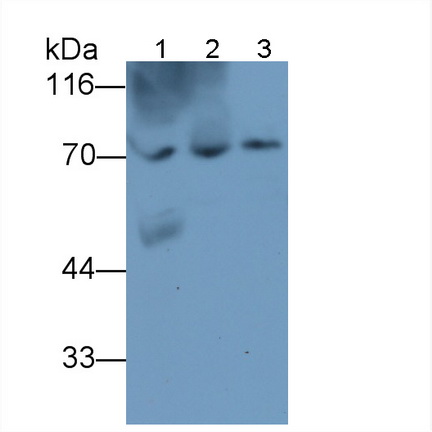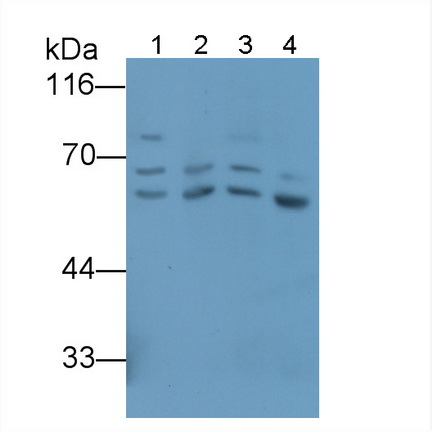HRP-Linked Polyclonal Antibody to Glucose 6 Phosphate Isomerase (GPI) 

AMF; NLK; PHI; SA36; Phosphoglucose Isomerase; Autocrine motility factor; Neuroleukin; Phosphohexose isomerase; Sperm antigen 36
- UOM
- FOB US$ 122.00 US$ 286.00 US$ 408.00 US$ 1,020.00 US$ 4,080.00
- Quantity
Overview
Properties
- Product No.LAA725Hu91
- Organism SpeciesHomo sapiens (Human) Same name, Different species.
- ApplicationsWBIf the antibody is used in flow cytometry, please check FCM antibodies.
Research use only - DownloadInstruction Manual
- CategoryMetabolic pathway
- SourceAntibody labeling
- Ig Type IgG, Potency n/a
- PurificationAntigen-specific affinity chromatography followed by Protein A affinity chromatography
- LabelHRP
- Original Antibody RPA725Hu01-Recombinant Glucose 6 Phosphate Isomerase (GPI)
- Buffer Formulation0.01M PBS, pH7.4, containing 0.05% Proclin-300, 50% glycerol.
- TraitsLiquid, Concentration 500µg/mL
Sign into your account
Share a new citation as an author
Upload your experimental result
Review

Contact us
Please fill in the blank.
Specifity
The antibody is a rabbit polyclonal antibody raised against GPI. It has been selected for its ability to recognize GPI in immunohistochemical staining and western blotting.
Usage
Western blotting: 0.5-3µg/mL
Immunohistochemistry: 5-30µg/mL
Immunocytochemistry: 5-30µg/mL
Optimal working dilutions must be determined by end user.
Storage
Store at 4°C for frequent use. Stored at -20°C in a manual defrost freezer for two year without detectable loss of activity. Avoid repeated freeze-thaw cycles.
Stability
The thermal stability is described by the loss rate. The loss rate was determined by accelerated thermal degradation test, that is, incubate the protein at 37°C for 48h, and no obvious degradation and precipitation were observed. The loss rate is less than 5% within the expiration date under appropriate storage condition.
Organism Species More: Mus musculus (Mouse), Rattus norvegicus (Rat)Giveaways
Increment services
-
 Protein A/G Purification Column
Protein A/G Purification Column
-
 Staining Solution for Cells and Tissue
Staining Solution for Cells and Tissue
-
 Positive Control for Antibody
Positive Control for Antibody
-
 Tissue/Sections Customized Service
Tissue/Sections Customized Service
-
 Phosphorylated Antibody Customized Service
Phosphorylated Antibody Customized Service
-
 Western Blot (WB) Experiment Service
Western Blot (WB) Experiment Service
-
 Immunohistochemistry (IHC) Experiment Service
Immunohistochemistry (IHC) Experiment Service
-
 Immunocytochemistry (ICC) Experiment Service
Immunocytochemistry (ICC) Experiment Service
-
 Flow Cytometry (FCM) Experiment Service
Flow Cytometry (FCM) Experiment Service
-
 Immunoprecipitation (IP) Experiment Service
Immunoprecipitation (IP) Experiment Service
-
 Immunofluorescence (IF) Experiment Service
Immunofluorescence (IF) Experiment Service
-
 Buffer
Buffer
-
 DAB Chromogen Kit
DAB Chromogen Kit
-
 SABC Kit
SABC Kit
-
 Real Time PCR Experimental Service
Real Time PCR Experimental Service
Citations
- Hyperthermia reduces migration of osteosarcoma by suppression of autocrine motility factorPubMed: 23027359
- Bruton's tyrosine kinase deficiency inhibits autoimmune arthritis but fails to block immune complex‐mediated inflammatory arthritisPubmed:26945549
- Bruton's Tyrosine Kinase Deficiency Inhibits Autoimmune Arthritis in Mice but Fails to Block Immune Complex–Mediated Inflammatory Arthritispubmed:26945549
- The GPI transamidase complex subunit PbGPI16 of Plasmodium berghei is important for inducing experimental cerebral malariaPubmed:29784863
- Proteomics analysis of asthenozoospermia and identification of glucose-6-phosphate isomerase as an important enzyme for sperm motilityPubmed: 31394311
- The Asthma-associated PER1-like domain-containing protein 1 (PERLD1) Haplotype Influences Soluble Glycosylphosphatidylinositol Anchor Protein (sGPI …Pubmed: 31959860
- T–B Lymphocyte Interactions Promote Type 1 Diabetes Independently of SLAM-Associated ProteinPubmed: 33199538







